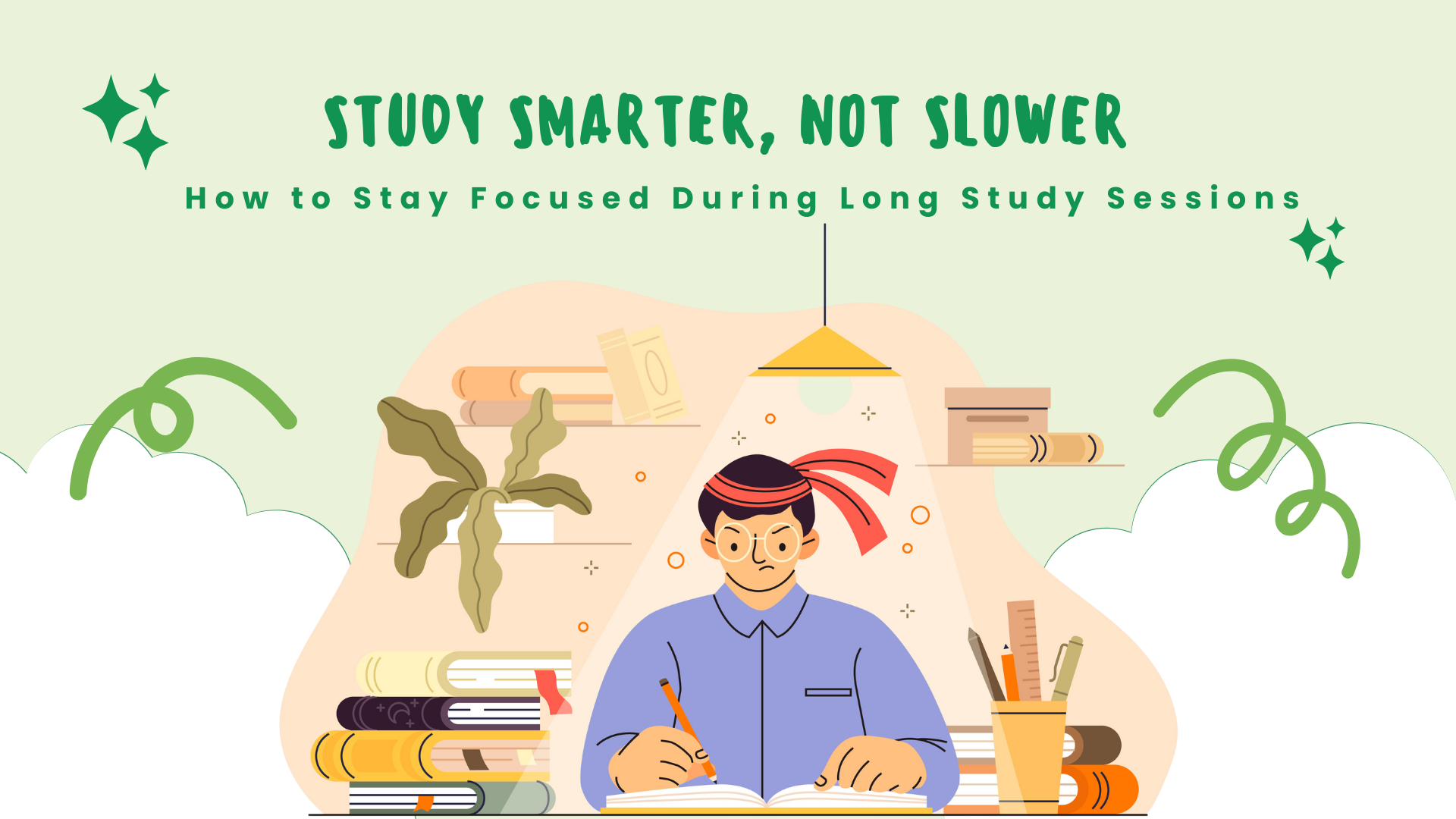Study Smarter, Not Slower: How to Stay Focused During Long Study Sessions
We’ve all been there, facing a massive study marathon with exams or deadlines looming just around the corner. Sitting down to power through hours of studying can feel overwhelming, and staying focused often feels like the biggest challenge. But don’t worry, you’re not alone!
Whether you’re cramming for finals, tackling a tough project, or planning your path with help from study abroad consultants, mastering the art of focus during long study sessions is key to success. In this blog, we’ll share proven tips and smart strategies to help you stay sharp, motivated, and productive when it matters most. Ready to turn those marathon study hours into your most effective learning sessions? Let’s dive in!
Struggling With Long Study Sessions: Here's How to Stay Productive While Studying
Ever noticed how some courses seem to demand hours and hours of your time? Whether it’s prepping for a tough exam or mastering a tricky concept, the clock keeps ticking, and distractions are everywhere. Social media pings, endless streaming options, and those never-ending notifications all make it way too easy to lose focus.
Chances are, you’ve googled “how to stay focused while studying” at least once. And honestly, who hasn’t? Let’s face it, our brains aren’t built to concentrate non-stop. Attention naturally rises and falls, which is why just powering through often backfires. Instead, you can make all the difference by creating a study plan that’s practical and smart.
12 Focus Hacks to Help You Study Longer and Smarter
Let’s face it: studying for long hours isn’t easy. Whether you're prepping for finals or trying to stay ahead in a tough course, staying focused can feel like a battle. The good news? You can train your brain to focus longer, with the right strategies.
Here’s how to study for extended periods without burning out or zoning out. These practical tips will help you stay productive, alert, and in control of your time.
-
Eliminate Distractions Before You Start
Before you even open your book, silence those notifications. Turn your phone on Do Not Disturb, use website blockers (like StayFocusd or Freedom), and keep distracting apps out of reach. A clean digital space leads to a clearer mind.
-
Choose the Right Study Environment
Your study space matters. Pick a quiet, clutter-free spot with good lighting and minimal interruptions. Whether it’s the library, a home desk, or a coffee shop with noise-cancelling headphones, find what helps you stay focused.
-
Use an Exam Study Planner or To-Do List
Don’t just wing it. Break down your study material into smaller, manageable chunks. Create a to-do list or a self study routine with clear goals, it keeps you organised and gives you a sense of progress.
-
Follow a Timed Personal Study Schedule (Like Pomodoro)
Try the Pomodoro Technique: 25–50 minutes of focused work followed by a 5–10 minute break. These short, timed bursts help maintain energy and prevent burnout. After 4 cycles, take a longer 15–30 minute break.
-
Start with the Hard Stuff First
Your brain is freshest at the beginning of your study session. Use that high-focus time to tackle the most difficult subjects, then shift to easier or more familiar topics later on.
-
Take Smart, Regular Breaks
Don’t skip breaks, they’re crucial for resetting your focus. Stand up, stretch, drink some water, or take a quick walk. Even a 2-minute break can help your brain recharge.
-
Reward Yourself
Finished a tough chapter? Give yourself a small reward. It could be a snack, a 10-minute scroll, or a short episode of your favourite show. Positive reinforcement keeps motivation high.
-
Use Active Learning Techniques
Reading passively leads to zoning out. Instead, engage with the material. Summarise out loud, explain concepts to a friend, write down key points, or quiz yourself, these methods improve retention and focus.
-
Try Group Study (If It Helps You)
Studying with focused peers can make learning more effective and less isolating. Just make sure the group stays on task, or it can become a distraction.
-
Stay Hydrated and Snack Smart
Your brain needs fuel. Drink water regularly and choose brain-friendly snacks like nuts, fruit, or dark chocolate. Avoid heavy or sugary foods that cause energy crashes.
-
Use Focus Music or Noise-Cancelling Headphones
If you’re in a noisy environment, noise-cancelling headphones are a game-changer. You can also try lo-fi beats, instrumental music, or white noise to help you get into the zone.
-
Prioritise Sleep and Consistency
No strategy works if you’re running on empty. Aim for 7–9 hours of sleep and try to study at the same time each day. A consistent and daily study routine helps train your brain to focus better over time.
Ready to try these tips out? Start with just a couple and build from there; you’ll be surprised how much more productive (and less stressed) you can feel.
When’s the Best Study Time for Students: How to Discover Your Peak Focus Hours
Ever wondered when you should study to get the most out of your time? The truth is, there’s no universal “best time to study,” it all depends on your personal rhythm.
Some people are laser-focused in the morning. Others do their best thinking late at night. What matters most is figuring out your peak productivity hours and making them work for you.
How to Find Your Best Time to Study and Memorise
Try this simple experiment for a week:
- Test different time slots: Study in the morning, afternoon, and evening to see when you’re most alert.
- Track your focus: Journal how focused or distracted you feel during each session.
- Notice patterns: Are you more productive after breakfast? Or do ideas click better after sunset?
Once you find your natural focus window, schedule your most important study sessions during those hours.
Smart Tips for Studying at the Right Time
- Study during your peak energy hours: Maximise focus when your brain is sharp.
- Avoid late-night cramming: A night study routine may backfire if you're already fatigued.
- Take regular breaks: Short breaks (5–10 minutes) between study blocks improve retention.
- Listen to your body: If you feel drained, switch to a lighter task or take a break.
Making a Study Schedule That Actually Works
Creating a study timetable isn’t just about blocking time, it’s about building a study routine that’s realistic and sustainable.
Here’s how to make one that sticks:
How to Create the Best Study Time Table That Lasts
- Start with your weekly commitments: Include classes, part-time work, meals, workouts, and downtime.
- Break study time into focused blocks: Aim for 1–2 hour sessions with short breaks in between.
- Mix subjects strategically: Avoid mental fatigue by rotating between different topics or tasks.
- Add buffer time: Leave space for review, unplanned delays, or extra rest; life happens.
- Stick to a consistent study routine or time table: Studying at the same times each day helps train your brain to focus.
There’s no magic hour that works for everyone. But once you figure out your best hour to study and build a study plan that’s flexible and realistic, you’ll study more efficiently and with less stress.
Boost Focus, Reduce Burnout: Final Thoughts on Smart Studying
Long study sessions can be tough, but with the right mindset, environment, and strategies, you can stay focused and actually enjoy the process. Whether you're gearing up for final exams, language proficiency tests, or competitive entrance exams for international universities, staying disciplined and mentally sharp gives you a serious edge.
Remember: it’s not just about pushing through the hours, it’s about studying smarter, not harder. Build a self study routine that works for you, take breaks when needed, and keep your eyes on the bigger goal.
Planning to study abroad? At Uscholars, we help students like you turn academic goals into global opportunities. From choosing the right program and university to guiding you through applications, visas, and scholarships, we’re with you every step of the way.


